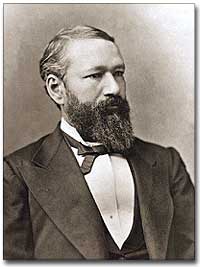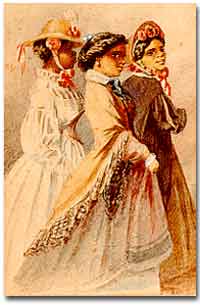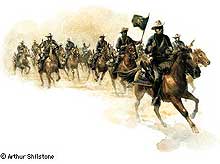35d. Rebuilding the Old Order

1872, P.B.S. Pinchback of Louisiana became the first black governor in America
Many Southerners, whether white or black, rich or poor, barely recognized the world in which they now lived. Wealthy whites, long-accustomed to plush plantation life and the perks of political power, now found themselves barred from voting and holding office. Their estates were in shambles. African-Americans were loathe to return to work for them. Poor white farmers now found blacks competing with them for jobs and land.
For the freed slave, Reconstruction offered a miraculous window of hope. Those born into slavery could now vote and own land. In parts of the South, blacks could ride with whites on trains and eat with them in restaurants. Schools, orphanages, and public relief projects aimed at improving the lives of blacks were emerging all over the South. Perhaps most stunning of all, African-Americans were holding political office. Blacks were becoming sheriffs and judges. They were elected to school boards and city councils. Sixteen blacks sat in Congress from 1867-77. Hiram Revels of Mississippi became the first African-American Senator in 1870. In December 1872 P.B.S. Pinchback of Louisiana became the first African-American Governor. All in all, about 600 blacks served as legislators on the local level. But as the saying goes, the more things change, the more they remain the same.

While some African Americans gained affluence in the Reconstructionist South, many toiled in conditions similar to the ones they endured during slavery.
Economically, African-Americans were disadvantaged. Most had skills best suited to the plantation. By the early 1870s sharecropping became the dominant way for the poor to earn a living. Wealthy whites allowed poor whites and blacks to work land in exchange for a share of the harvest. The landlord would sometimes provide food, seed, tools, and shelter. Sharecroppers often found themselves in debt, for they had to borrow on bad terms and had to pay excessively for basic supplies. When the harvest came, if the debt exceeded harvest revenues, the sharecropper remained bound to the owner. In many ways, this system resembled slavery.
Many whites resented and rejected the changes taking place all about them. Taxes were high. The economy was stagnant. Corruption ran rampant. Carpetbaggers and scalawags made matters worse. Carpetbaggers were Northerners who saw the shattered South as a chance to get rich quickly by seizing political office now barred from the old order. After the war these Yankees hastily packed old-fashioned traveling bags, called carpetbags, and rushed south. "Scalawags" were southern whites, who allied themselves with the Carpetbaggers, and also took advantage of the political openings.

After the Civil War, some African American troops stayed in the Army. The most famous of these men were known as the Buffalo Soldiers, who moved West and fought in the Indian Wars.
Out of a marriage of hatred and fear, the Ku Klux Klan, the Knights of the White Camelia, and the White Brotherhood were born. They are all supremacy groups who aimed at controlling African-Americans through violence and intimidation. Massacres, lynching, rape, pillaging and terror were common. In essence, these groups were paramilitary forces serving all those who wanted white supremacy. And it was not only ex-Confederate soldiers and poor whites. Ministers, merchants, military officers and other professionals donned hoods, burned crosses, and murdered those who interfered with their vision.
Emancipated blacks began finding the new world looking much like the old world. Pressure to return to plantations increased. Poll taxes, violence at the ballot box, and literacy tests kept African-Americans from voting — sidestepping the 15th Amendment.
Slavery was over. The struggle for equality had just begun.





